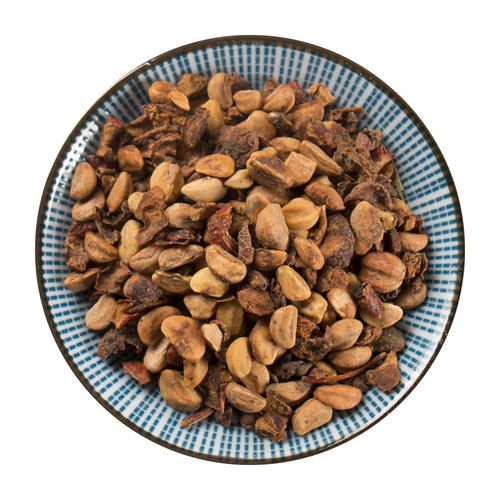Product Overview
Parts used: Dried ripe fruit
TCM category: Tonic herbs for Yin Deficiency
TCM nature: Neutral
TCM taste(s): Sweet
Meridian affinity: Kidney Liver
Scientific name: Lycium barbarum
Other names: Wolfberry, Lycium chinense, Gou Qi Zi, Lycii berry
Use of goji berries (Gou Qi Zi) in TCM
Please note that you should never self-prescribe TCM ingredients. A TCM ingredient is almost never eaten on its own but as part of a formula containing several ingredients that act together. Please consult a professional TCM practitionner, they will be best able to guide you.
Preparation: Pick the fruit when it is ripe, remove the stem and dry in the shade until wrinkles appear.
Dosage: 2 to 4 fruits
Main actions according to TCM*: Tonifies the Yin of the Liver and Yin of the Kidneys. Brightens the eyes. Moistens the Lungs.
Primary conditions or symptoms for which goji berries may be prescribed by TCM doctors*: Knee pain Tinnitus Diabetes Anemia Impaired vision
Contraindications*: Should not be used by those with patterns of Heat and Excess, nor should it be used when there is Spleen Deficiency with Dampness or loose stools. Unidentified Goji berry phytochemicals may inhibit metabolism of other medications, such as those processed by the cytochrome P450 liver enzymes. Such drugs include Warfarin, or drugs for diabetes or hypertension.
Common TCM formulas in which goji berries are used*:
For Kidney Essence Deficiency manifested by an aching back, dizziness and Heat on the soles of the feet combine goji berries with glossy privet fruits (Nu Zhen Zi) and angular solomon's seal roots (Yu Zhu).
For improving vision, relieving tinnitus and headaches combine goji berries with chrysanthemum flowers (Ju Hua).
For impotence, spermatorrhea, premature ejaculation, weak and low sperm count combine goji berries with plantain seeds (Che Qian Zi), cuscuta seeds (Tu Si Zi), palmleaf raspberries (Fu Pen Zi) and schisandra berries (Wu Wei Zi).
For Liver and Kidney Yin Deficiency combine goji berries with chrysanthemum flowers (Ju Hua) and glossy privet fruits (Nu Zhen Zi).
For premature aging and gray hair combine goji berries with glossy privet fruits (Nu Zhen Zi), fleeceflower roots (He Shou Wu) and ginseng (Ren Shen).
For weakness of the back and knees, lassitude and lack of appetite combine goji berries with king solomon's seal roots (Huang Jing).
For Kidney deficiency with lower back pain and impotence combine goji berries with palmleaf raspberries (Fu Pen Zi), plantain seeds (Che Qian Zi) and cuscuta seeds (Tu Si Zi).
For Liver and Kidney deficiency with diminished visual acuity combine goji berries with palmleaf raspberries (Fu Pen Zi), prepared rehmannia (Shu Di huang) and glossy privet fruits (Nu Zhen Zi).
For Kidney Yin deficiency with pain and weakness of the lower back combine goji berries with dendrobium (Shi Hu) and achyranthes roots (Niu Xi).
For Kidney deficiency with impotence and shivers combine goji berries with cordyceps (Dong Chong Xia Cao), yam (Shan Yao) and cornelian cherries (Shan Zhu Yu).
Key TCM concepts behind goji berries (Gou Qi Zi)'s properties
In Traditional Chinese Medicine (TCM), goji berries are plants that belong to the 'Tonic herbs for Yin Deficiency' category. Tonic herbs are used for patterns of Deficiency, when one lacks one of the 'Four Treasures' (Qi, Blood, Yin and Yang). Yin tonics have a heavy, moist nature. They either nourish the Kidneys and Liver or moisten the Lungs and Stomach. Extreme Yin Deficiency often translates into a 'burn-out', unfortunately more and more common among people today. It is worth mentioning that another great remedy against Yin Deficiency is a lot of rest and sleep; no herb will ever be able to replace this!
Furthermore goji berries are plants that are Neutral in nature. This means that goji berries typically don't affect the balance in your body. Balance between Yin and Yang is a key health concept in TCM. Eating too many "Hot" (Yang) ingredients can lead to an imbalance whereby one has a Yang excess. The inverse is true as well: too many "Cold" (Yin) ingredients can lead to a Yin excess. The Neutral nature of goji berries means that you don't have to worry about that!
Goji berries also taste Sweet. The so-called "five elements" theory in Chinese Medicine states that the taste of TCM ingredients is a key determinant of their action in the body. Sweet ingredients like goji berries tend to slow down acute reactions and detoxify the body. They also have a tonic effect because they replenish Qi and Blood.
The tastes of ingredients in TCM also determine what organs and meridians they target. As such goji berries are thought to target the Kidney and the Liver. According to TCM, the Kidneys do not only regulate the urinary system but also play a key role in the reproductive system and the growth and aging process of the body. The Liver on the other hand is often referred as the body's "general" because it is in charge of regulating the movements of Qi and body fluids. It also takes a leading role in balancing our emotions.
The tastes of ingredients in TCM also determine what organs and meridians they target. As such goji berries are thought to target the Kidney and the Liver. According to TCM, the Kidneys do not only regulate the urinary system but also play a key role in the reproductive system and the growth and aging process of the body. The Liver on the other hand is often referred as the body's "general" because it is in charge of regulating the movements of Qi and body fluids.
Use of goji berries (Gou Qi Zi) as food
Goji berries are also eaten as food. It is used as an ingredient in dishes such as Goji Berry Chickpea Salad or Goji berries granola bars.










